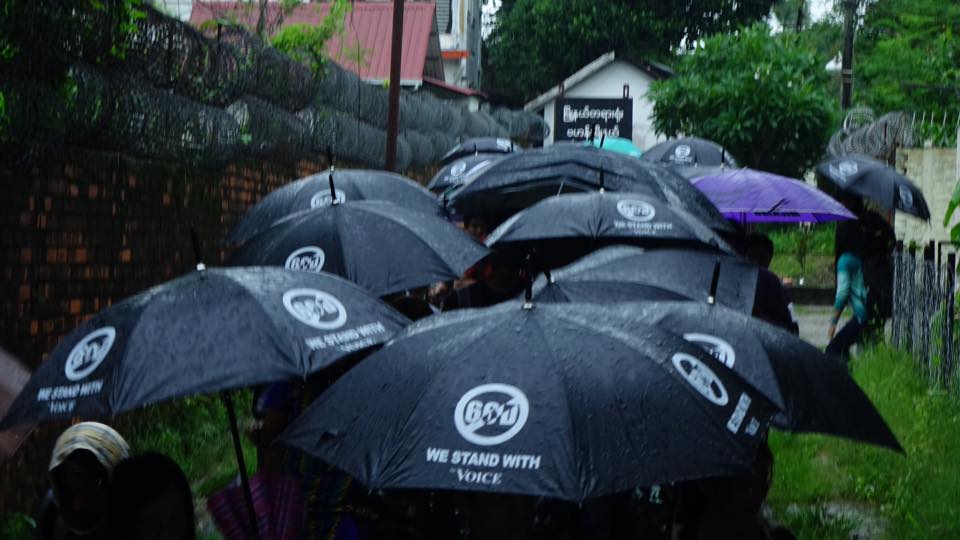A court in Rangoon’s Bahan Township denied bail to the The Voice Daily’s editor-in-chief and a satire columnist for the newspaper on Thursday, with the judge ruling that the defendants’ legal counsel had failed to provide the necessary medical documents to secure their release from police custody.
The two men, facing defamation charges under the controversial article 66(d) of the 2013 Telecommunications Law, appeared in court for a preliminary hearing on Thursday morning. They have been detained at the Bahan Township police station since their arrest on Friday of last week.
Following the hearing, the defendants’ lawyer Khin Maung Myint told reporters at the office of The Voice that his clients would resubmit their bail petition at their next hearing. The legal advocate said he did not believe the court would again reject the request.
“The medical documentation didn’t reach the court in time because of heavy traffic. This is the reason why the court denied bail. I believe that the court will accept our appeal at the coming hearing,” he said.
He added that the judge gave another justification for denying bail, saying the defendants remained within a remand period that extends until 16 June, the same day the next court hearing has been scheduled for.
A military officer filed the defamation suit against The Voice’s editor-in-chief, Kyaw Min Swe, and the columnist who writes under the pen name British Ko Ko Maung, after the latter wrote a satirical take on the country’s long-running civil conflict. Published on 26 March, the article coincided with the airing of “Union Oath,” a film that aired on the military-owned Myawaddy TV channel.
Lieutenant Colonel Tun Tun Oo, the plaintiff in the case, took offence and lodged a complaint first with the Myanmar Press Council, saying the article had harmed the military’s diginity. The council, which is supposed to serve as a mediating body in cases involving disputes with the media, failed to do so and a legal case was filed against The Voice duo last month.
Earlier this week journalists in Rangoon and Mandalay launched a “white armband” campaign condemning the mushrooming prosecutions under article 66(d), and after Thursday’s hearing about 100 journalists marched from the Bahan Township court to the office of The Voice in Tamwe Township in support of the defendants.
The case involving The Voice is not the first to put journalists before a judge for online defamation; another high-profile, ongoing case involves Rangoon Chief Minister Phyo Min Thein, who filed a 66(d) lawsuit against the CEO and chief editor of Eleven Media Group after the latter penned an article in which he implied that the chief minister was engaged in ethically dubious conduct.
On Thursday, journalists involved in the march criticised article 66(d), saying the provision appears to contradict section 354 of the constitution, which guarantees the right “to express and publish freely … convictions and opinions,” unless found to undermine “law and order, community peace and tranquillity or public order and morality.”
[related]
Section 66(d) reads, anyone “extorting, coercing, restraining wrongfully, defaming, disturbing, causing undue influence or threatening to any person by using any telecommunications network” can face prosecution and a possible prison sentence of up to three years.
The Protection Committee for Myanmar Journalists (PCMJ), which organised Thursday’s solidarity march, called for the release of The Voice defendants.
Ma Thuzar, a member of the PCMJ, said the committee believed bail would be granted at the preliminary trial on Thursday. She said its members were shocked by the decision of Judge Tharaphi.
“We will hold a meeting soon on how to continue our movement at the coming trial. We will also monitor whether bail is granted at the next trial or not,” she said.
The parliamentary Commission for the Assessment of Legal Affairs and Special Issues recently suggested amendments to section 66(d) that, if approved by lawmakers, would guarantee bail for defendants and reduce the maximum prison sentence for a 66(d) offence from three years to two.
National League for Democracy Central Executive Committee member Win Htein, who is also a member of the commission, told DVB on Thursday that the commission had sent those recommendations to Parliament and the Union attorney general, but he declined to offer further details on the suggested amendments.
“I cannot tell you what is mentioned regarding amendment,” he said.



